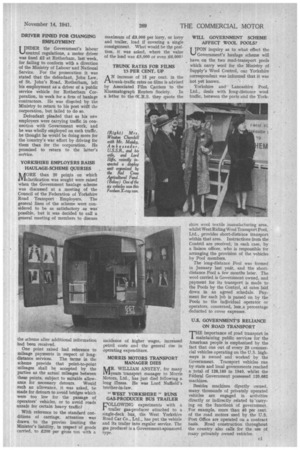DRIVER FINED FOR CHANGING EMPLOYMENT
Page 21

If you've noticed an error in this article please click here to report it so we can fix it.
UNDER the Government's labour L./control regulations, a motor driver was fined £2 at Rotherham, last week, for failing to conform with a direction of the Ministry of Labour and National Service. For the prosecution it was stated that the defendant, John Law, of St. John's Road, Rotherham, left his employment as a driver of a public service vehicle for Rotherham Corporation, to work for a firm of haulage contractors. He was directed by the Ministry to return to his post with the corporation, but failed to do so.
Defendant pleaded that as his new employers were carrying traffic in connection with Government work, and he was wholly employed on such traffic, he thought he would be doing more for the country's war effort by driving for them than for the corporation. He promised to return to the latter's service.
YORKSHIRE EMPLOYERS RAISE HAULAGE-SCHEME QUERIES
1UORE than 20 points on which 0.111clarification was sought were raised when the Government haulage scheme was discussed at a meeting of the Council of the Federation of Yorkshire Road Transport Employers. The general lines of the scheme were considered to be as satisfactory as was possible, but it was decided to call a general meeting of members to discuss
the scheme after additional information had been received.
One point raised had reference to mileage payments in respect of long distance services. The terms in the scheme provide that point-to-point mileages shall be accepted by the parties as the actual mileages between these points, subject to suitable allow ance for necessary detours. Would such an allowance, it was asked, be made for detours to avoid bridges which were too low for the passage of operators' vehicles, or to avoid roads unsafe for certain heavy traffic?
With reference to the standard conditions of carriage, attention was drawn to the proviso limiting the Minister's liability, in respect of goods carried, to £200 per gross ton with a maximum of £3,000 per lorry, or lorry and trailer, load if covering a single consignment. What would be the position, it was asked, where the value of the load was £5,000 or even £6,000?
TRUNK RATES FOR FILMS 15 PER CENT. UP
AN increase of 15 per cent. in the trunk-traffic rates on films is advised by Associated Film Carriers to the
Kinematograph Renters Society. In a letter to the IK.R.S. they quote the incidence of higher wages, increased petrol costs and the general rise in operating expenditure.
.MORRIS MOTORS TRANSPORT MANAGER DIES N4R. WILLIAM ANSTEY, for many /Ylyears transport manager to Morris Motors, Ltd., has just died following a long illness. He was Lord Nuffield's brother-in-law.
"WEST YORKSHIRE" RUNS GAS-PRODUCER BUS TRAILER COLLOWING experiments with a 1 trailer gas-producer attached to a single-deck bus, the West Yorkshire Road Car Co., Ltd., has put the vehicle and its trailer into regular service. The gas producer is a Government-sponsored type. WILL GOVERNMENT SCHEME AFFECT WOOL POOLS?
UPON inquiry as to what effect the Government's haulage scheme will have on the two road-transport pools which carry wool for the Ministry of Supply's Wool Control, our Yorkshire correspondent was informed that it was not yet known.
Yorkshire and Lancashire Pool, Ltd., deals with long-distance wool traffic, between the ports and the York shire wool textile .manufacturing area, whilst WestRiding Wool Transport Pool, Ltd., provides short-distance transport within that area. Instructions from the Control are received, in each case, by a liaison officer, who is responsible for arranging the provision of the vehicles by Pool members.
The long-distance Pool was formed in January last year, and the shortdistance Pool a few months later. The wool carried is Government owned, and payment for its transport is made to the Pools by the Control, at rates laid down in an agreed schedule. Payment for each job is passed on by the Pools to the individual operator or operators, concerned, less a percentage deducted to cover expenses.
U.S. GOVERNMENT'S RELIANCE ON ROAD TRANSPORT
THE importance of road transport in maintaining public services for the American people is emphasized by the fact that one out of every 20 commercial vehicles operating on the U.S. highways is owned and worked by the Government. Transport vehicles run by state and local governments reached a total of 128,165 in 1940, whilst the Federal Government possessed 120,662 machines.
Besides machines directly owned, many thousands of privately operated vehicles are engaged in activities directly or indirectly related to 'carrying on the functionS of government. For example, more than 40 per cent. of the road motors used by the U.S. Post Office are operated on a contract basis. Road construction throughout the country also calls for the use of many privately owned vehicles.
























































